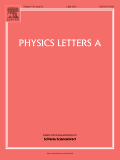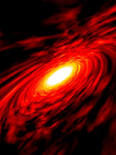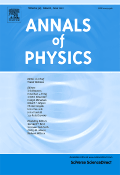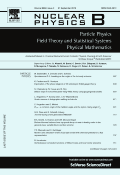
PHYSICS LETTERS A
metrics 2024
Illuminating Discoveries in Physics and Astronomy
Introduction
Physics Letters A is a renowned scientific journal published by Elsevier, dedicated to the field of physics and astronomy. Established in 1963, it has continuously evolved, offering a platform for the swift dissemination of significant research findings in various branches of physics. As of 2023, it holds a commendable Q2 ranking in the category of Physics and Astronomy (miscellaneous) and ranks 69th out of 243 journals in the same domain according to Scopus, positioning itself in the 71st percentile of academic impact. With its comprehensive scope, Physics Letters A provides a vital resource for researchers, professionals, and students, facilitating academic discourse and advancing knowledge across the field. Although it does not currently offer Open Access options, its rigorous peer-review process ensures high-quality content. It is centrally located in Amsterdam, Netherlands, and continues to be an essential outlet for innovative contributions to the physics community through the year 2024 and beyond.
Metrics 2024
 0.48
0.48 2.30
2.30 2.10
2.10 189
189Metrics History
Rank 2024
Scopus
IF (Web Of Science)
JCI (Web Of Science)
Quartile History
Similar Journals

INTERNATIONAL JOURNAL OF MODERN PHYSICS A
Exploring the cosmos and the building blocks of matter.INTERNATIONAL JOURNAL OF MODERN PHYSICS A, published by WORLD SCIENTIFIC PUBL CO PTE LTD, stands as a pivotal platform in advancing the frontiers of research within the fields of Astronomy and Astrophysics, Atomic and Molecular Physics, and Nuclear and High Energy Physics. Established in 1989, this journal has systematically contributed to the scientific community, with a demonstrated impact as indicated by its Q2 category rankings across these critical disciplines in 2023. Researchers and professionals are encouraged to engage with its rigorous peer-reviewed content, fostering a deeper understanding of modern physics theories and experimental breakthroughs. Although the journal operates under a conventional access model, it remains a vital resource for those seeking to disseminate their findings and stay abreast of cutting-edge developments. With an emphasis on quality and breadth of research, the journal continues to attract submissions from leading physicists and scholars, enhancing its reputation as a key academic resource.

Gravitation & Cosmology
Advancing Knowledge in Gravitation and CosmologyGravitation & Cosmology is a vital academic journal founded to explore the profound concepts of gravitation and the dynamics of the universe. Published by MAIK NAUKA/INTERPERIODICA/SPRINGER, this journal features a comprehensive range of research articles, reviews, and theoretical insights that advance the field of astronomy and astrophysics. With a current impact factor reflective of its esteemed contribution, Gravitation & Cosmology operates within the upper tier of its discipline, classified as Q3 in Astronomy and Astrophysics for 2023. Although not an open-access publication, the journal fosters a vibrant community of scholars and practitioners by providing rigorous peer-reviewed content accessible through various academic platforms. Covering converged years from 2008 to 2024, this journal serves as an indispensable resource for anyone keen on deepening their understanding of gravitational phenomena and cosmological theories. Researchers, professionals, and students alike will find valuable insights and innovative research that push the boundaries of contemporary astrophysical knowledge.

Annual Review of Nuclear and Particle Science
Connecting Theories and Discoveries in Particle PhysicsAnnual Review of Nuclear and Particle Science is a prestigious journal published by Annual Reviews, focused on the fields of nuclear and high-energy physics. With an impressive impact factor that reflects its authority and influence—ranked Q1 in its category and holding a commendable Scopus rank of #2 out of 87, placing it in the 98th percentile—the journal serves as an essential resource for researchers, professionals, and advanced students alike. Covering pivotal developments and comprehensive reviews in nuclear and particle physics since its inception in 1978, this journal offers unparalleled insights into cutting-edge research and theoretical advancements. While it is not open access, the value of its scholarly content is evidenced by its rigorous peer-review process and its role in shaping contemporary discourse within the scientific community. With contributions from leading experts and a commitment to disseminating foundational and emerging theories, the Annual Review of Nuclear and Particle Science is indispensable for those seeking a deep understanding of the complexities in these dynamic fields.

Physics
Innovating Knowledge: Your Gateway to Physics DiscoveriesPhysics, published by MDPI, is an open-access journal that commenced in 2019 and has quickly established itself as a significant contributor to the field of physics and astronomy. With a respectable impact factor and categorized in the Q2 quartile for 2023, this journal serves a broad spectrum of topics within the discipline, fostering innovative research and insights. As part of the MDPI portfolio, known for promoting high-quality, peer-reviewed research, Physics aims to provide a platform for scholars, professionals, and students to publish their findings and engage with contemporary debates in the field. The journal's accessibility, paired with its commitment to scientific excellence, ensures that research is readily available to a global audience, which is crucial for advancing knowledge and collaboration in physics. Located in the heart of Switzerland at ST ALBAN-ANLAGE 66, CH-4052 BASEL, the journal enjoys a position at the nexus of cutting-edge research and academia.

Annals of Physics
Leading discoveries in the realm of Physics and Astronomy.Annals of Physics is a premier journal published by Academic Press Inc Elsevier Science, specializing in the expansive field of Physics and Astronomy. Since its inception in 1957, this journal has played a pivotal role in disseminating high-quality research and advancements across various sub-disciplines of physics. With a notable impact factor making it rank in the Q1 category for 2023, it stands among the top tier of scholarly publications, specifically sitting at Rank #63 out of 243 in the field, placing it in the 74th percentile according to Scopus metrics. Researchers are encouraged to submit their findings to reach a broad audience without the constraints of Open Access fees, promoting extensive visibility within the academic community. As we look ahead to 2024, Annals of Physics continues to be an essential resource for professionals, students, and academics striving to advance the frontiers of knowledge in physics and astronomy.

Physics of the Dark Universe
Decoding the Secrets of Dark Energy and MatterPhysics of the Dark Universe is a premier academic journal published by Elsevier, dedicated to advancing the understanding of dark matter, dark energy, and their implications for the universe. With its ISSN N/A and E-ISSN 2212-6864, the journal has established a notable presence since its inception in 2012, operating out of Amsterdam, Netherlands. As evidenced by its impressive impact factor and its ranking in the top quartile in both Astronomy and Astrophysics (Q1) and Space and Planetary Science (Q1) categories for 2023, this journal is a vital resource for researchers and practitioners within these fields. In the latest Scopus ranks, it ranks #12 out of 104 in Earth and Planetary Sciences and #13 out of 90 in Physics and Astronomy, placing it in the 88th and 86th percentiles respectively, underlining its academic significance. The journal is not Open Access, yet it plays an essential role in disseminating high-quality research that pushes the boundaries of knowledge about the cosmos and its most enigmatic components. Researchers, professionals, and students interested in the forefront of astrophysics will find this journal an indispensable tool for staying abreast of emerging discoveries and ongoing debates.

INTERNATIONAL JOURNAL OF THEORETICAL PHYSICS
Advancing Knowledge in Mathematics and PhysicsInternational Journal of Theoretical Physics is a premier academic journal dedicated to the advancement of knowledge in the fields of theoretical physics and mathematics. Published by Springer/Plenum Publishers, this esteemed journal has been a vital platform for researchers since its inception in 1968. With an impressive track record and an emphasis on high-quality, innovative research, the journal currently ranks in the third quartile (Q3) in both the Mathematics (Miscellaneous) and Physics and Astronomy (Miscellaneous) categories as of 2023. While the journal is not open access, it offers accessible subscription options for institutions and individuals. The International Journal of Theoretical Physics serves as an essential resource for scholars and practitioners looking to deepen their understanding and contribute to the evolving landscape of theoretical research, making it a key player in nurturing academic discourse and fostering collaboration in its field.

Universe
Innovating the Future of Astronomy and Physics.Universe is a distinguished peer-reviewed journal published by MDPI, specializing in the dynamic fields of Physics and Astronomy. Established in 2015, this Open Access journal has rapidly gained recognition, achieving a prestigious Q1 quartile ranking in its category as of 2023. With its E-ISSN 2218-1997, the journal primarily serves the international scientific community, offering a platform for researchers to disseminate innovative ideas and findings. Based in Switzerland, Universe covers a wide range of topics within astronomy and astrophysics, ensuring that cutting-edge research is accessible to an ever-growing audience. Its commitment to open access principles since its inception allows for unrestricted dissemination of knowledge, fostering a collaborative environment essential for scientific advancement. By aligning its objectives with the promotion of high-quality research and interdisciplinary discourse, Universe stands as a vital resource for academics, professionals, and students aiming to contribute to and engage with the ever-evolving landscape of astronomical research.

NUCLEAR PHYSICS B
Catalyzing Breakthroughs in High Energy PhysicsNUCLEAR PHYSICS B, published by Elsevier, stands at the forefront of research in the dynamic field of Nuclear and High Energy Physics. Established in 1967, this prestigious journal has developed a reputation for excellence, now positioned in the Q1 category according to its 2023 quartile rankings. With an impressive Scopus rank of #21 out of 87 in its category and a commendable 76th percentile, it serves as a vital resource for scholars investigating the underlying principles of nuclear interactions and particle physics. The journal transitioned to an Open Access model in 2014, ensuring that groundbreaking research is accessible to a global audience. Its commitment to quality and innovation makes NUCLEAR PHYSICS B an essential platform for researchers, professionals, and students aiming to stay at the cutting edge of discoveries in this expansive field, contributing to the scientific discourse for nearly six decades.

Journal of Cosmology and Astroparticle Physics
Pioneering Insights into Dark Energy and Particle PhysicsThe Journal of Cosmology and Astroparticle Physics (ISSN: 1475-7516) is a premier publication in the field of astronomy and astrophysics, dedicated to advancing our understanding of the cosmos through innovative research. Published by IOP Publishing Ltd in the United Kingdom, this journal has established itself as a vital resource for researchers, professionals, and students alike, with an impressive Scopus rank of #11/90, placing it in the top 12% of its field. The journal aims to foster the dissemination of groundbreaking studies related to cosmology, dark energy, particle physics, and the universe's fundamental structure, making it a key player in shaping contemporary astrophysics discourse. With a Category Quartile of Q2 as of 2023, it continues to attract high-quality contributions that enhance scholarly dialogue. As an accessible platform, it engages a diverse audience interested in the frontiers of astrophysical research, encouraging collaboration and knowledge sharing among the global scientific community.